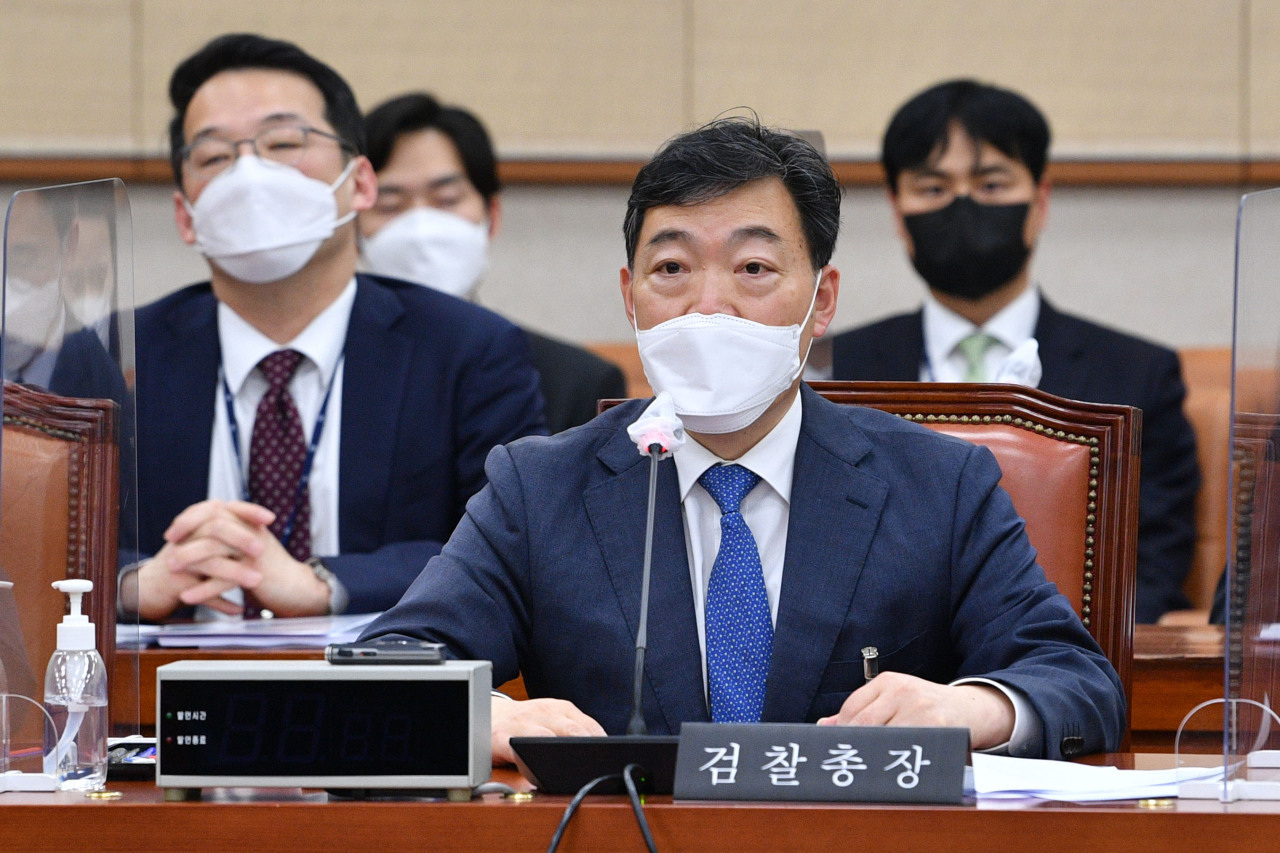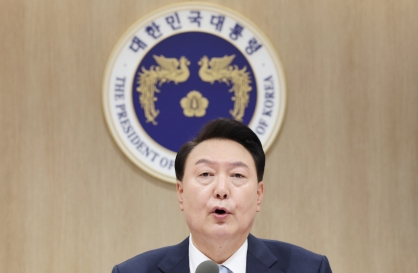Prosecution fights at all levels to protect investigative powers
Democratic Party starts deliberations to have the bill passed within weeks
By Ko Jun-taePublished : April 19, 2022 - 14:54

The first nationwide meeting of junior prosecutors in 19 years has been called, as the prosecution continues to vocally oppose the legislative push to strip investigative powers from the law enforcement agency, despite growing calls for the ruling party to stop acting against public interest.
At 7 p.m. Tuesday at the Supreme Prosecutors’ Office in Seocho-gu, southern Seoul, around 150 junior prosecutors from offices across South Korea were scheduled to gather and express discontent with proposed revisions to the Criminal Procedure Act and the Prosecutors’ Office Act.
It is the first national level movement from junior prosecutors since such a gathering in 2003 when they expressed opposition to personnel decisions for the prosecution by then-Justice Minister Kang Keum-sil.
During Tuesday’s meeting, junior prosecutors were planning to discuss what issues could arise if the bill is passed as proposed, while sharing what side effects could occur if the prosecution loses its investigative power. They were also discussing possibly delivering a collective statement of their views to the president and the parliament speaker.
The group was planning to release a statement on the details of the discussion following the meeting.
The meeting comes after leaders of six high prosecutors’ offices met and decided to put joint efforts forward to stop the bill from being enacted. Prosecutor General Kim Oh-soo led the opinion by expressing the intent to resign Sunday.
The senior prosecutors were united in denouncing the Democratic Party of Korea’s actions. They said the ruling party was unreasonably pushing to completely strip the prosecution’s long-held power to investigate cases, saying the move will only benefit criminals and undermine public interest.
President Moon Jae-in turned down Kim’s resignation, but asked the chief prosecutor to engage in negotiations with legislators after the two met at Cheong Wa Dae on Monday afternoon.
An official with the presidential office said Moon did not accept the resignation as Kim has more than a year left in his two-year term, and that he should be engaging in talks with the National Assembly as the chief prosecutor if he wants to make negotiations.
“As the president has said, I plan to express the prosecution’s opinions in an orderly manner and, as a representative of the prosecution, submit them directly to the National Assembly,” Kim told reporters Tuesday.
“The prosecution needs to deeply reflect on itself, considering the fact that such reform legislation is being discussed.”
Kim suggested the parliament drop the bill in question and instead enact a special law ensuring fairness and neutrality in investigations run by the prosecution. He also suggested having senior prosecutors regularly appear for parliamentary hearings or audits to be questioned by lawmakers.
Meanwhile, the controversial bill officially entered the legislative process by undergoing discussion procedures at a subcommittee under the parliamentary legislation and judiciary committee.
Rep. Park Ju-min of the Democratic Party convened a subcommittee meeting at 7 p.m. Monday to begin deliberations on the proposed revisions, and a fierce debate ensued between members of the liberal party and their counterparts from the conservative People Power Party.
The Democratic Party aims to pass the bill within the April provisional assembly and promulgate it into law at the Moon administration’s last Cabinet meeting on May 3.
Kim appeared at the subcommittee’s Tuesday meeting and emphasized the bill in question would be a direct violation of the Constitution if passed, urging legislators to focus instead on responding to prosecution reform measures already in place.
He said the general public was experiencing immense difficulties already after some investigative powers were taken away from the prosecution, as police investigations are now taking longer and demands for supplementary investigations increase.
Kim agreed that reform measures were needed as checks on the prosecution, but argued that trying to pass a bill in two weeks is unreasonable and inappropriate.
“I want to emphasize that it is important now for the courts, prosecution, police and the judiciary to work jointly to make sure current policies are well settled even if we plan to continue with this prosecution reform,” Kim said.
“Would it be possible to monitor the legality of police investigations if prosecutors cannot verify facts themselves and have no choice but to rely on the police?” he added.
President-elect Yoon Suk-yeol’s transition team vocally expressed opposition to the Democratic Party’s push, asking the bill to be dropped immediately. The bill is directly against the public interest, and the Democratic Party is abusing its legislative power to essentially launch a “coup,” the team argues.
“The bill is so against the Constitution that even the judiciary says it has never heard of any legislative proposal like this before, which means the bill cannot be justified in itself, and only the innocent members of the public will be damaged from it,” Yoon’s presidential transition committee said in a statement Tuesday.
“Even the judiciary essentially voiced opposition to the bill, saying the 13 proposed revisions to the Criminal Procedure Act need additional review or modifications.”
At 7 p.m. Tuesday at the Supreme Prosecutors’ Office in Seocho-gu, southern Seoul, around 150 junior prosecutors from offices across South Korea were scheduled to gather and express discontent with proposed revisions to the Criminal Procedure Act and the Prosecutors’ Office Act.
It is the first national level movement from junior prosecutors since such a gathering in 2003 when they expressed opposition to personnel decisions for the prosecution by then-Justice Minister Kang Keum-sil.
During Tuesday’s meeting, junior prosecutors were planning to discuss what issues could arise if the bill is passed as proposed, while sharing what side effects could occur if the prosecution loses its investigative power. They were also discussing possibly delivering a collective statement of their views to the president and the parliament speaker.
The group was planning to release a statement on the details of the discussion following the meeting.
The meeting comes after leaders of six high prosecutors’ offices met and decided to put joint efforts forward to stop the bill from being enacted. Prosecutor General Kim Oh-soo led the opinion by expressing the intent to resign Sunday.
The senior prosecutors were united in denouncing the Democratic Party of Korea’s actions. They said the ruling party was unreasonably pushing to completely strip the prosecution’s long-held power to investigate cases, saying the move will only benefit criminals and undermine public interest.
President Moon Jae-in turned down Kim’s resignation, but asked the chief prosecutor to engage in negotiations with legislators after the two met at Cheong Wa Dae on Monday afternoon.
An official with the presidential office said Moon did not accept the resignation as Kim has more than a year left in his two-year term, and that he should be engaging in talks with the National Assembly as the chief prosecutor if he wants to make negotiations.
“As the president has said, I plan to express the prosecution’s opinions in an orderly manner and, as a representative of the prosecution, submit them directly to the National Assembly,” Kim told reporters Tuesday.
“The prosecution needs to deeply reflect on itself, considering the fact that such reform legislation is being discussed.”
Kim suggested the parliament drop the bill in question and instead enact a special law ensuring fairness and neutrality in investigations run by the prosecution. He also suggested having senior prosecutors regularly appear for parliamentary hearings or audits to be questioned by lawmakers.
Meanwhile, the controversial bill officially entered the legislative process by undergoing discussion procedures at a subcommittee under the parliamentary legislation and judiciary committee.
Rep. Park Ju-min of the Democratic Party convened a subcommittee meeting at 7 p.m. Monday to begin deliberations on the proposed revisions, and a fierce debate ensued between members of the liberal party and their counterparts from the conservative People Power Party.
The Democratic Party aims to pass the bill within the April provisional assembly and promulgate it into law at the Moon administration’s last Cabinet meeting on May 3.
Kim appeared at the subcommittee’s Tuesday meeting and emphasized the bill in question would be a direct violation of the Constitution if passed, urging legislators to focus instead on responding to prosecution reform measures already in place.
He said the general public was experiencing immense difficulties already after some investigative powers were taken away from the prosecution, as police investigations are now taking longer and demands for supplementary investigations increase.
Kim agreed that reform measures were needed as checks on the prosecution, but argued that trying to pass a bill in two weeks is unreasonable and inappropriate.
“I want to emphasize that it is important now for the courts, prosecution, police and the judiciary to work jointly to make sure current policies are well settled even if we plan to continue with this prosecution reform,” Kim said.
“Would it be possible to monitor the legality of police investigations if prosecutors cannot verify facts themselves and have no choice but to rely on the police?” he added.
President-elect Yoon Suk-yeol’s transition team vocally expressed opposition to the Democratic Party’s push, asking the bill to be dropped immediately. The bill is directly against the public interest, and the Democratic Party is abusing its legislative power to essentially launch a “coup,” the team argues.
“The bill is so against the Constitution that even the judiciary says it has never heard of any legislative proposal like this before, which means the bill cannot be justified in itself, and only the innocent members of the public will be damaged from it,” Yoon’s presidential transition committee said in a statement Tuesday.
“Even the judiciary essentially voiced opposition to the bill, saying the 13 proposed revisions to the Criminal Procedure Act need additional review or modifications.”










![[KH Explains] How should Korea adjust its trade defenses against Chinese EVs?](http://res.heraldm.com/phpwas/restmb_idxmake.php?idx=644&simg=/content/image/2024/04/15/20240415050562_0.jpg&u=20240415144419)







